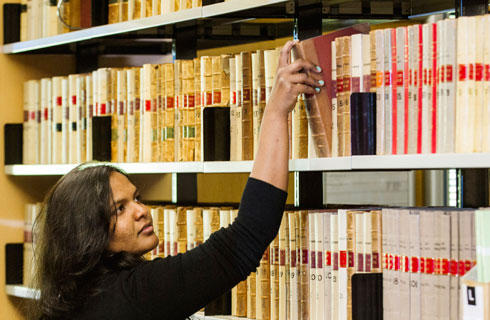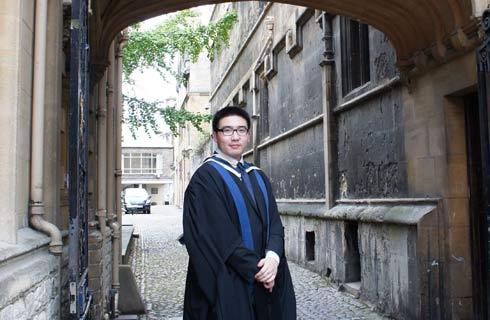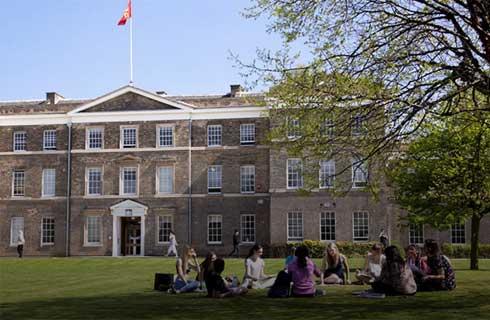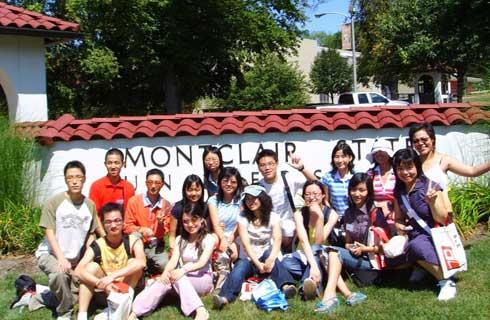应用翻译研究硕士
MA Applied Translation Studies

学历文凭
Masters Degree (Taught)

专业院系
School of Languages, Cultures and Societies

开学时间

课程时长

课程学费

国际学生入学条件
IDP—雅思考试联合主办方

雅思考试总分
7.0
- 雅思总分:7
- 托福网考总分:95
- 托福笔试总分:160
- 其他语言考试:PTE Academic at 68 overall with no less than 60 in writing and 64 in all other components. LanguageCert Academic at 75 overall with no less than 65 in writing and 70 in all other components. Oxford ELLT Global at 8 overall with no less than 6 in writing and 7 in all other components. A suitable Cambridge English qualification at 185 overall with no less than 169 in writing and 176 in all other components.
CRICOS代码:
申请截止日期: 请与IDP联系 以获取详细信息。
课程简介
This course places considerable emphasis on computer-assisted translation and project management, giving you valuable experience of the localisation, project and terminology management tools that are used in professional practice. You'll also work with students specialising in a wide range of languages to carry out multilingual translation projects. Provided you pass our entry translation test(s), you can specialise in translation between English and up to three languages, as follows: from Arabic, Chinese, French, German, Italian, Japanese, Portuguese, Russian and Spanish into English, and from English into Arabic and Chinese. In addition, you will be able to choose from optional modules informed by the research of our experts on topics such as audiovisual translation, machine translation, literary translation, legal translation and genre analysis. You will be taught by both leading Centre for Translation and Interpreting Studies researchers and contracted practitioners who will equip you with a strong knowledge base and practical skills to launch an exciting career in the language services industry. Specialist facilitiesAs a proud member of CIUTI (Conférence internationale permanente d'instituts universitaires de traducteurs et interprètes), the Centre for Translation and Interpreting Studies benefits from excellent facilities and resources to support your studies. Our Martin Thomas Translation Labs (MTL1 and MTL2) support all of our translation programmes, complete with around 60 high-spec PCs and a wide range of specialist software for translation and subtitling. The Centre for Translation and Interpreting Studies is also constantly compiling and updating very large corpora of texts in digital form so you can analyse source texts and produce more idiomatic translations. Moreover, you can also see our interpreting students at work in our state-of-the-art conference suites. This course is also available to study part-time over 24 months. In addition to translation theory and specialised translation, this course focuses on providing you with training in the different facets of the Language Services Industry, from localisation and project management, to working with CAT tools, communicating and negotiating effectively, and developing finance and marketing skills. In this context, the core modules provide specialised training in an impressive range of software tools widely used by leading translation and localisation companies, such as Trados Studio, Multiterm and Passolo, memoQ, Phrase, OmegaT, Matecat, Verifka and Xbench. You will also have access to additional cutting-edge language technologies such as Dragon NaturallySpeaking, Sketch Engine, and PerfectIt. Note that access to certain software is subject to availability. Our core modules include multilingual group projects, sometimes organised in collaboration with local or global NGOs or educational partners. These projects provide valuable experience of translation and localisation project management, as well as localisation, translation, post-editing machine translation (PEMT), revision and review work, giving you a much more accurate idea of the complexities of managing real projects, starting with the client briefing and going through the analysis and quoting stage, the actual translation, PEMT or revision and quality assurance, and the final delivery, invoicing, and reflection.
相关申请
 预科
预科 奖学金
奖学金 实习机会
实习机会 在校学习
在校学习 跨境学习
跨境学习 校园授课-线上开始
校园授课-线上开始 在线/远程学习
在线/远程学习
开学时间&学费
学费信息仅供参考,请与IDP联系以获取详细信息
| 开学时间 | 时长 | 学费 | 地点 |
|---|
学校排名

世界排名153
数据源:
泰晤士高等教育世界大学排名
关于利兹大学

利兹大学在《2025 完整大学指南》中名列英国大学前25名,在2025 QS世界大学排名中名列世界前100名。它也是罗素大学集团大学之一,这是英国著名的顶尖研究密集型大学名单。该大学的学生满意度很高,在英国排名第三(2018年《泰晤士报高等教育学生体验调查》)。作为同一项调查的一部分,该大学的校园设施在英国排名第二,这是对学生发挥潜力的绝佳校园的认可。近年来,两栋新建筑投资超过1.2亿英镑。体育设施也被认为是世界级的。The Edge是一个为学生提供的令人难以置信的健身中心,包括一个25米的室内游泳池、攀岩墙和为不同体育活动设置的各种大厅。这是一所热情友好的大学,拥有充满活力、多样化的学生群体。事实上,来自世界130多个不同国家的13800多名国际学生在利兹大学学习。学生会是这个国家最活跃、最活跃的工会之一。学生可以加入300多个俱乐部和社团,利兹大学联盟(LUU)是英国第一个被全国学生联合会评为''优秀''的俱乐部和社团。
本校相关课程

生物多样性与保护
学历文凭
Masters Degree (Taught)
开学日期
课程费用总额


统计博士学位
学历文凭
Ph.D.
开学日期
课程费用总额


纯粹数学博士学位
学历文凭
Ph.D.
开学日期
课程费用总额


应用数学博士学位
学历文凭
Ph.D.
开学日期
课程费用总额


PhD in Geography
学历文凭
Ph.D.
开学日期
课程费用总额


PhD in Microwave and Millimetre Wave Engineering
学历文凭
Ph.D.
开学日期
课程费用总额

其他相关课程

法语和数学(荣誉)文学士学位
 斯特灵大学
斯特灵大学泰晤士高等教育世界大学排名:594
学历文凭
Bachelor Degree with Honours
开学日期
课程费用总额


文学硕士(荣誉学位)意大利语和波斯语
 圣安德鲁斯大学
圣安德鲁斯大学泰晤士高等教育世界大学排名:162
学历文凭
Bachelor Degree
开学日期
课程费用总额


硕士(荣誉)德语/意大利语
 格拉斯哥大学
格拉斯哥大学泰晤士高等教育世界大学排名:84
学历文凭
Bachelor Degree
开学日期
课程费用总额


文学硕士-法语
 奥克兰大学
奥克兰大学学历文凭
Masters Degree (Research)
开学日期
课程费用总额


法语学士(荣誉)学士学位
 华威大学
华威大学泰晤士高等教育世界大学排名:123
学历文凭
Bachelor Degree
开学日期
课程费用总额


商务英语强化课程(伦敦校区)
 Stafford House International
Stafford House International学历文凭
English Language
开学日期
课程费用总额










